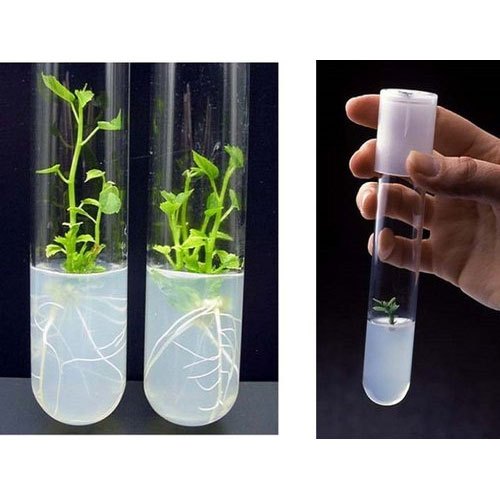Botany Notes On – Plant Tissue Culture – For W.B.C.S. Examination.
উদ্ভিদ বিদ্যা নোট – উদ্ভিদ টিস্যু সংস্কৃতি – WBCS পরীক্ষা।
Procedure of Plant tissue culture
The part(s) of the plant used for culturing is known as explants. The explants are cultured in-vitro on a nutrient medium that caters to fulfill its nutritional requirements. The nutrient medium must provide the following:-Continue Reading Botany Notes On – Plant Tissue Culture – For W.B.C.S. Examination.
- Macronutrients – This includes elements like nitrogen (N), phosphorus (P), potassium (K), calcium (Ca), sulfur (S) which is required for proper growth and morphogenesis.
- Micronutrients – Elements like iron (Fe), manganese (Mn), zinc (Zn) etc., which are also crucial to the growth of tissues.
- Carbon or Energy source – This is one of the most crucial ingredients of the nutrient media. Sucrose is the most widely used carbon source among other carbohydrates that serve to provide C, H, and O.
- Vitamins, amino acids, and other inorganic salts.
Apart from these, the culture media also serves as a medium for supplying phytohormones or plant growth regulators to the issues which bring about their morphogenesis as per requirement. The tissues of the explants first lose their specificity to form a hard brown lump known as callus. The callus then splits to develop a plant organ or a whole new plant depending upon the quantity and composition of phytohormones supplied. The entire process requires strict aseptic conditions to be maintained at all times as a single contamination can ruin an entire batch of plants.
Uses of Plant tissue culture
Tissue culture is used to develop thousands of genetically identical plants from one single parent plant known as soma clones, and this process is known as micropropagation. The method offers an advantage over other methods as it can be used to develop disease free plants from disease-rode plants by using their meristems (apical and axillary) as explants.
Since this method produces new plantlets by the score of thousands, it has been used extensively for production of commercially important plants including food plants like tomato, banana, apple etc. The most notable example of the application of micropropagation was observed in the farming of orchids as it rose exponentially due to the availability of millions of plantlets thanks to tissue culture methods.
Tissue culture is the in vitro aseptic culture of cells, tissues, organs or whole plant under controlled nutritional and environmental conditions often to produce the clones of plants. The resultant clones are true-to type of the selected genotype. The controlled conditions provide the culture an environment conducive for their growth and multiplication. These conditions include proper supply of nutrients, pH medium, adequate temperature and proper gaseous and liquid environment.
Plant tissue culture technology is being widely used for large scale plant multiplication. Apart from their use as a tool of research, plant tissue culture techniques have in recent years, become of major industrial importance in the area of plant propagation, disease elimination, plant improvement and production of secondary metabolites.Small pieces of tissue (named explants) can be used to produce hundreds and thousands of plants in a continuous process. A single explant can be multiplied into several thousand plants in relatively short time period and space under controlled conditions, irrespective of the season and weather on a year round basis. Endangered, threatened and rare species have successfully been grown and conserved by micropropagation because of high coefficient of multiplication and small demands on number of initial plants and space.
In addition, plant tissue culture is considered to be the most efficient technology for crop improvement by the production of somaclonal and gametoclonal variants. The micropropagation technology has a vast potential to produce plants of superior quality, isolation of useful variants in well-adapted high yielding genotypes with better disease resistance and stress tolerance capacities . Certain type of callus cultures give rise to clones that have inheritable characteristics different from those of parent plants due to the possibility of occurrence of somaclonal variability , which leads to the development of commercially important improved varieties. Commercial production of plants through micropropagation techniques has several advantages over the traditional methods of propagation through seed, cutting, grafting and air-layering etc. It is rapid propagation processes that can lead to the production of plants virus free . Coryodalisyanhusuo, an important medicinal plant was propagated by somatic embryogenesis from tuber-derived callus to produce disease free tubers . Meristem tip culture of banana plants devoid from banana bunchy top virus (BBTV) and brome mosaic virus (BMV) were produced . Higher yields have been obtained by culturing pathogen free germplasmin vitro. Increase in yield up to 150% of virus-free potatoes was obtained in controlled conditions. The main objective of writing this chapter is to describe the tissue culture techniques, various developments, present and future trends and its application in various fields.
For Guidance of WBCS (Exe.) Etc. Preliminary , Main Exam and Interview, Study Mat, Mock Test, Guided by WBCS Gr A Officers , Online and Classroom, Call 9674493673, or mail us at – mailus@wbcsmadeeasy.in
Visit our you tube channel WBCSMadeEasy™ You tube Channel
Please subscribe here to get all future updates on this post/page/category/website



 +919674493673
+919674493673  mailus@wbcsmadeeasy.in
mailus@wbcsmadeeasy.in






































































































